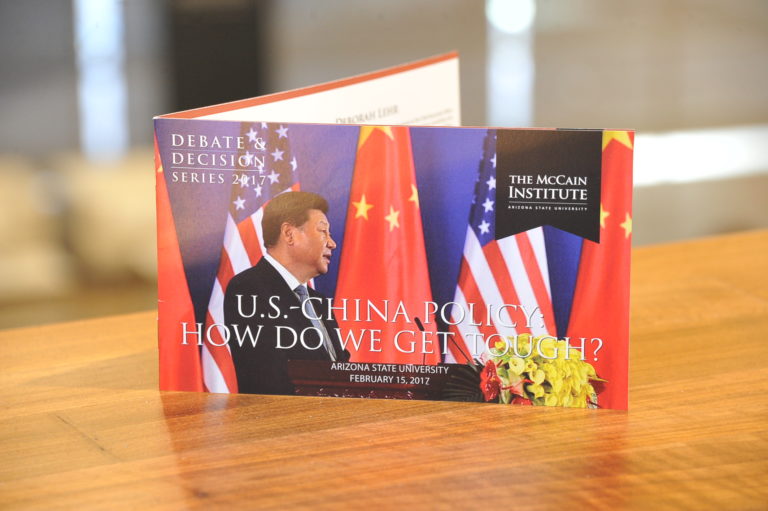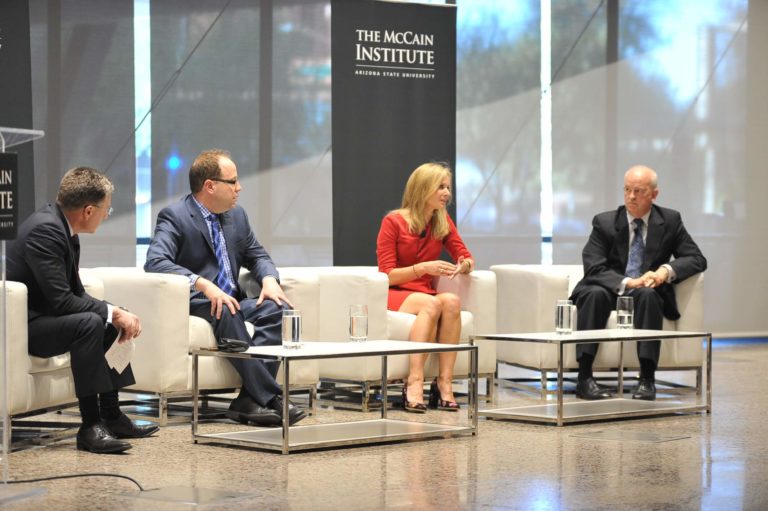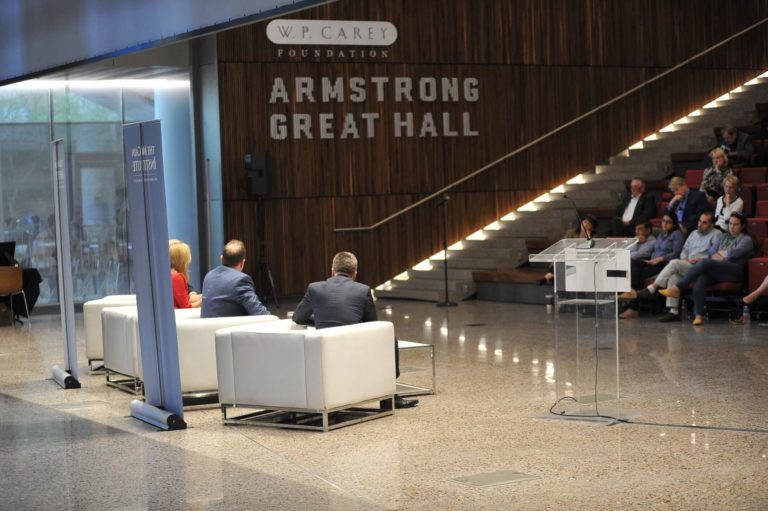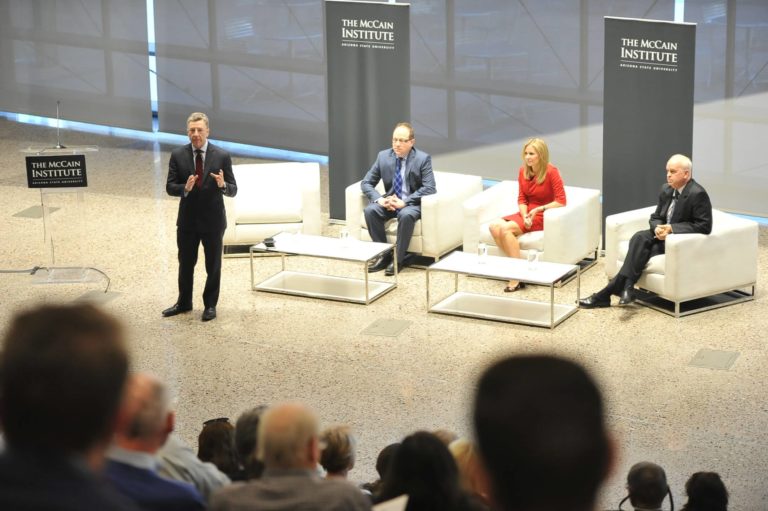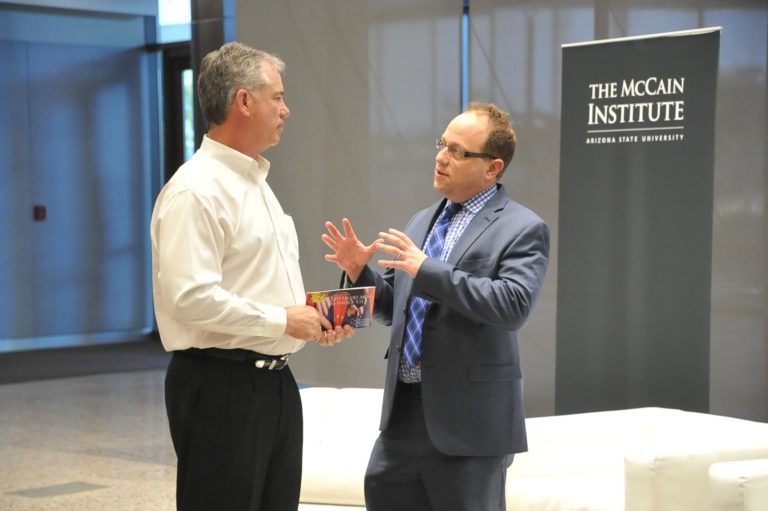On February 15, 2017, the McCain Institute hosted the debate “U.S.-China Policy: How Do We Get Tough?” at Arizona State University’s Beus Center for Law and Society in Phoenix. The debate centered on the U.S.-China relationship in terms of economics, human rights, and security and what the U.S. strategy toward China should be.
Participants were: Dan Blumenthal, Director of Asian Studies, American Enterprise Institute; Gary Dirks, Director, Julie Ann Wrigley Global Institute of Sustainability; and Deborah Lehr, Senior Fellow, Paulson Institute, University of Chicago.
Dan Blumenthal, Argument
China feels humiliated by U.S. dominance in the Pacific and believes it should play the central role in Asian economics and security. China also faces economic and structural headwinds which might make it more aggressive. As a result, China is increasingly posing a threat to U.S. alliances and maritime freedom of action. The rosy scenarios for liberalization that were predicted following Chinese accession into WTO did not take place. Instead, the United States has empowered China by taking it into the WTO, allowing China to devote more money on its military.
In the South China Sea, China wants to do what the United States did in the Caribbean in the 1800s: they want to push the Americans back. The United States has not seriously challenged China as yet, but it can. The United States is a long-time maritime power and has allies in the region, unlike China. The greatest risk looking forward is China overstepping in South China Sea – underestimating U.S. resolve and its endurance in the Asia-Pacific.
On the positive side, Mr. Blumenthal mentioned that Asian countries want America to remain active in the region. China’s reckless behavior is pushing more Asian countries into closer relations with the United States.
Recommendations: Build up the U.S. military presence in the South China Sea. President Trump’s strategy of making Beijing just a little scared is good when dealing with China.
Gary Dirks, Argument
What China is doing should not come as a surprise. The Chinese will press their interests. The United States should do the same. As with any society, belief systems change only very slowly. China will be no exception. We should not expect a significant change in values or beliefs from China any time soon. Americans should also remember that China is not monolithic. Chinese leadership has competing factions, often with very different agendas. Domestically, China still struggles with poverty, environmental degradation and widespread corruption. In foreign policy, China is extending its influence through commercial mechanisms. Infrastructure is a key mechanism, but not the only one. We should expect China to continue building commercial ties and compete with the United States globally.
When it comes to the South China Sea, Dr. Dirks stressed that China’s ambitions are not about oil and gas: there is simply not enough there. Though not his area of expertise, Dirks speculates that the audience for these moves are the immediate neighbors and perhaps more importantly the restless and nationalistic, domestic left. There is a risk that a Chinese miscalculation in the South China Sea can lead to confrontation with the United States.
On the positive side, Dr. Dirks says that Americans should not overestimate Chinese leadership. We often give them more credit for using their economic and political power than they deserve. They often do “bad deals” and we are “winning” against China on many issues. Moreover, China will not seek to “blow up” the global economic system because it is too big and they depend too much on it.
Recommendations: Focus on bilateral trade and freshen up old agreements. Do not mess with the “One China Policy.” Try instead to find common ground on pressing issues of mutual importance. North Korea, which is a serious problem would be one good candidate.
Deborah Lehr, Argument
As China continues to become a significant part of the global economy, it is important to work with them to bring the country into rules-based organizations when possible, as China will not hesitate to set its own rules otherwise. In the case of trade and investment, Chinese foreign policy will follow to protect China’s growing economic interests overseas. Establishing high-level mechanisms to identify potential disagreements as well as to explore possible areas of cooperation can help mitigate the risk of a serious conflict. The Strategic Economic Dialogue as launched by then-Secretary Hank Paulson is one example.
In addition, while China’s accession to the World Trade Organization was a win-win for both countries overall, there has not been a significant trade agreement negotiated between the two countries since that time 15 years ago. And in the past ten years, China has not significantly opened any sectors to foreign investment. While there has been “reform” of the economy, it does not always equate to market opening, nor reform in the Western sense of the word as the “state” will continue to play a significant role in the economy. Therefore, the United States should be aggressive in pursuing its own economic interests as well as considering bilateral negotiations to open key sectors in China to U.S. exports.
In the region, one of the biggest determinants of the United States’ continuing influence will be the state of U.S.-China relations.
Recommendations: Continue to have a comprehensive approach, and focus on promoting the United States’ interests in trade and investment. Also, promoting U.S. beliefs as part of this strategy, such as support for human rights, can be part of the overall approach, if handled appropriately.


